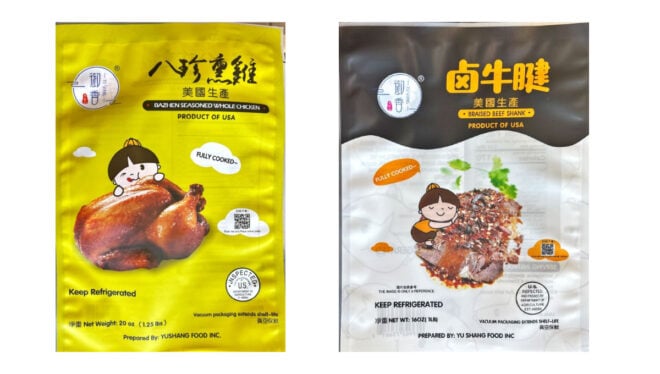December 2, 2025 | 02:53 GMT +7
December 2, 2025 | 02:53 GMT +7
Hotline: 0913.378.918
December 2, 2025 | 02:53 GMT +7
Hotline: 0913.378.918

The products subject to recall bear the establishment number “P-46684” or “EST. M46684” inside the USDA mark of inspection.
Yu Shang Food, Inc., a Spartanburg, SC, business, over the weekend recalled 4,589 pounds of ready-to-eat (RTE) meat and poultry products, which may have been adulterated with Listeria monocytogenes, according to the U.S. Department of Agriculture’s Food Safety and Inspection Service (FSIS).
The ready-to-eat meat and poultry items were produced from Oct. 21 to Oct. 27, 2024. Their “used by” dates range from Aug. 21, 2025, to Aug. 27, 2025. View the full product list. View labels.
The products subject to recall bear the establishment number “P-46684” or “EST. M46684” inside the USDA mark of inspection. They were shipped to retail locations nationwide and available for purchase online.
The problem was discovered after FSIS performed routine testing and follow-up activities on the finished product produced by Yu Shang Food, Inc. on October 21, 2024, which confirmed that the product was positive for Listeria monocytogenes.
Consumption of food contaminated with L. monocytogenes can cause listeriosis, a serious infection that often affects older adults, people with weakened immune systems, and pregnant women and their newborns. Less commonly, people outside these risk groups are affected.
Food contaminated with Listeria monocytogenes may not look or smell spoiled but can still cause serious and sometimes life-threatening infections. Anyone who has eaten any recalled product and developed symptoms of Listeria infection should seek medical treatment and tell their doctors about possible Listeria exposure.
Also, anyone who has eaten any of the recalled products should monitor themselves for symptoms during the coming weeks because symptoms of listeriosis can develop up to 70 days after exposure to Listeria.
Symptoms of Listeria infection can include vomiting, nausea, persistent fever, muscle aches, severe headache, and neck stiffness. Specific laboratory tests are required to diagnose Listeria infections, which can mimic other illnesses.
Pregnant women, the elderly, young children, and people such as cancer patients who have weakened immune systems are particularly at risk of serious illnesses, life-threatening infections, and other complications. Although infected pregnant women may experience only mild, flu-like symptoms, their infections can lead to premature delivery, infection of the newborn, or even stillbirth.
FSIS is concerned that some products may be in consumers’ refrigerators/freezers. Consumers who have purchased these products are urged not to consume them. They should be thrown away or returned to the place of purchase.
FSIS routinely conducts recall effectiveness checks to verify that recalling firms notify their customers of the recall and take steps to ensure that the product is no longer available to consumers. When available, the retail distribution list(s) will be posted on the FSIS website at www.fsis.usda.gov/recalls.
(FSN)

(VAN) The inevitable path forward is to reorganize production along the value chain, utilizing cooperatives as the core, enterprises as the driving force, and farmers as the central subjects.

(VAN) On November 28, Minister Tran Duc Thang, together with China's Minister of Agriculture and Rural Affairs Han Jun, chaired the 2nd meeting of the Viet Nam - China Agricultural Cooperation Committee.

(VAN) Forest carbon credits are only accepted when they ensure absolute environmental integrity, additionality, permanence, and transparency.

(VAN) Viet Nam partners with Beijing on controlling air pollution, cross-regional management, high-tech monitoring and relocating polluting facilities.

(VAN) With a USD 50 million investment, Australia is partnering with Viet Nam to operate its first public electric bus fleet and develop a nationwide EV charging network.

(VAN) On November 28, in Beijing, Minister Tran Duc Thang met Minister of Ecology and Environment of China Huang Runqiu, to share experience on environmental protection.
/2025/11/28/0950-2-120557_751.jpg)
(VAN) The recent flood spell in the South Central region clearly reflects the characteristics of natural disasters in 2025, which are compound, prolonged, and amplified.